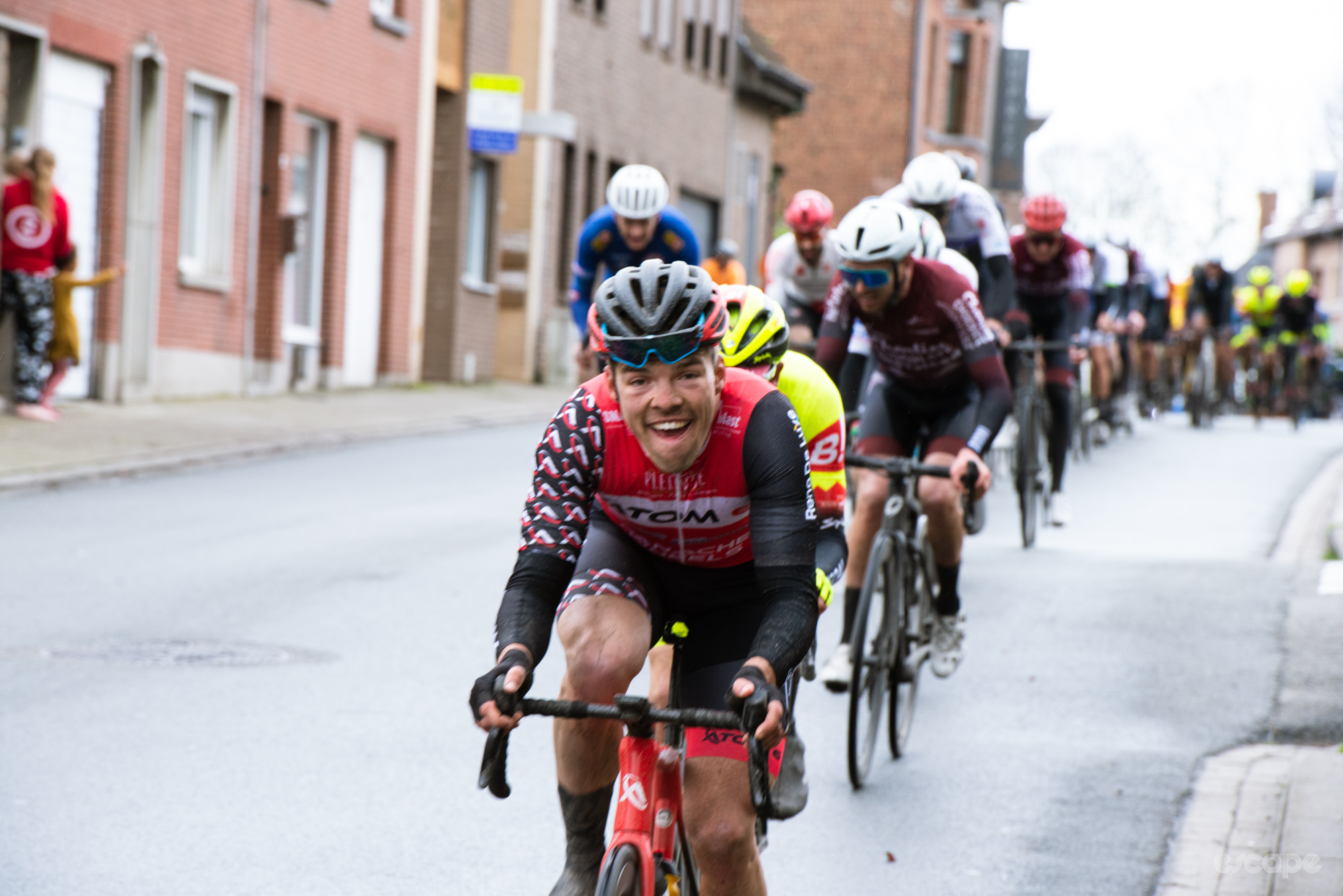It feels right and proper that waves of rain keep sweeping through in light gray sheets, turning corners slippery and splattering faces in the messy leftovers from nearby farming. The main street in Bellegem rises 100 meters over the Belgian lowlands, and an aluminum finish-line gantry has been erected just before the top. There are five bars clustered on one end and two homes for the elderly with big picture windows on the other. Ronan says he wants to spend his final days in one of them so he can watch kermesses from his bedroom window. A small square cart selling frites and burgers and dried, whole fish has pulled up on the sidewalk near the finish line. Next to it a woman in her 80s peers through another large window, watching the racers go by every ten minutes or so. She waves and smiles when I turn around from leaning on the metal barriers, beer in hand.
The bookie is easy to spot. Blue suede shoes and a perfectly waxed moustache, very well turned-out. Plus a four-foot-high whiteboard covered in the scribbled names and numbers of about 40 of the 175 starters. All a dead giveaway that this is our man, and that he’s good at his job. He’s set up a large umbrella and the cash, a considerable sum, sits inside a small box with flaking yellow paint that points to years of service, protected by two old women in wooden folding chairs. Stealing from your grandmother is frowned upon and with two of them here, nobody seems particularly concerned about security. In a couple hours, a man who picked the winner will walk away with at least six crisp 50-Euro notes and a large smile.
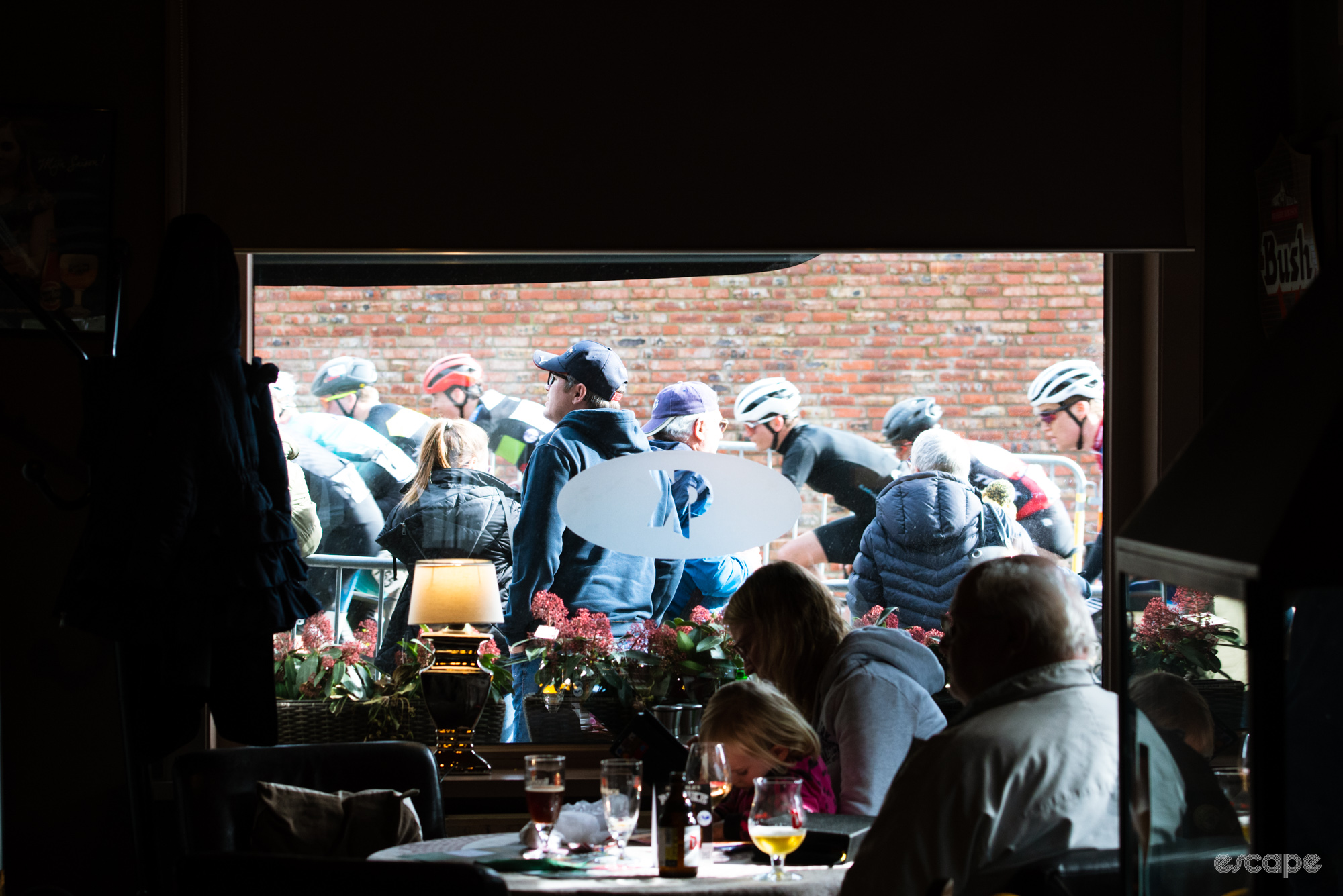
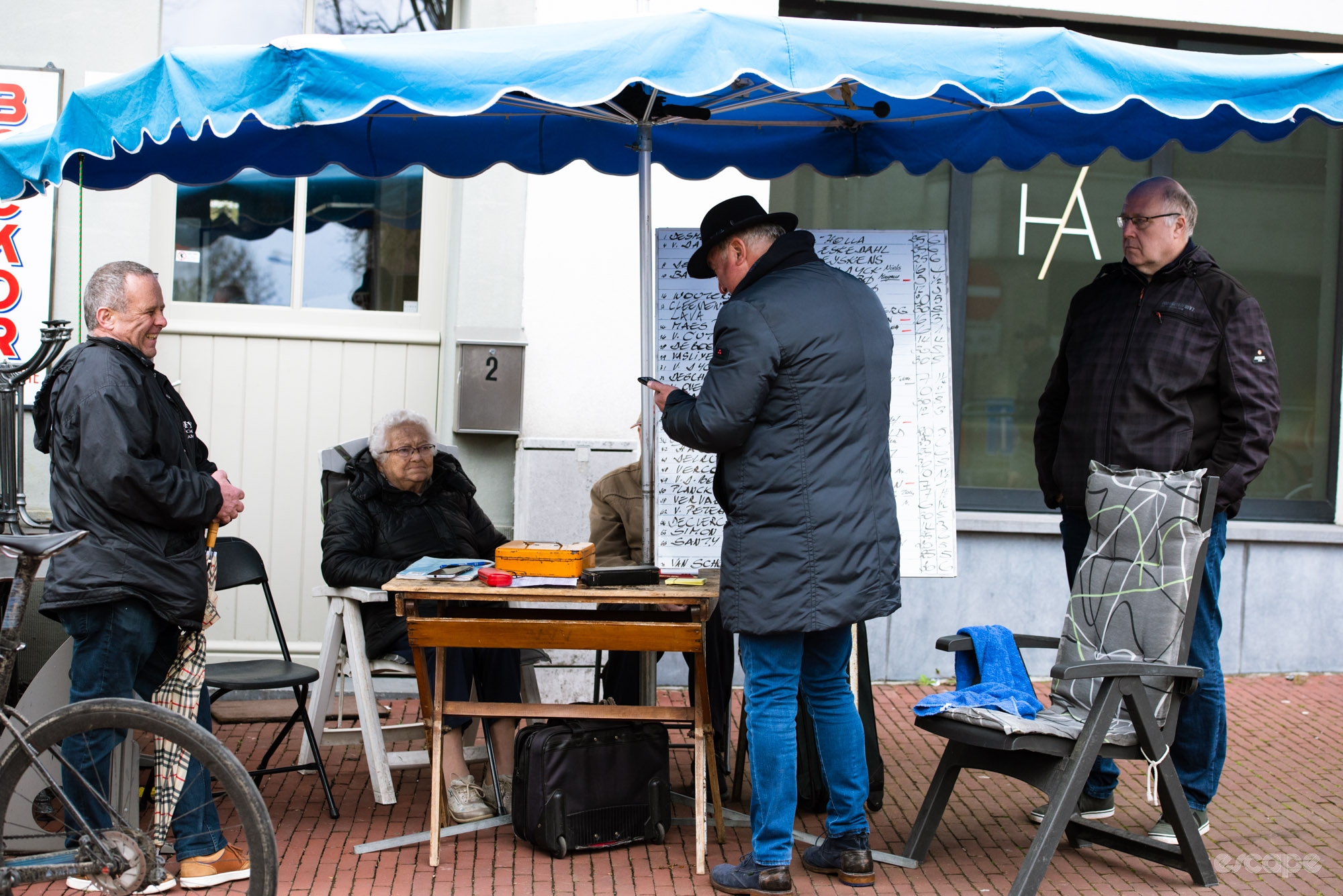
It costs 17 Euros to enter the race, a bit more than it used to. You get five of that back if you return the two numbers, one for the frame and one for your jersey. If you google “how to race a Belgian kermesse” you end up on a page written by the Chainstay, a house that often boards young racers looking to break into the scene. It says in big block letters BE SURE TO BRING YOUR OWN SAFETY PINS! THE RACE ORGANIZERS NEVER HAVE ANY. Ronan did not bring his safety pins. His rear tire is slowly deflating and his shifting has been inexplicably jumpy since we rode the Roubaix cobbles with the Trek-Segafredo team yesterday. We are unprepared but optimistic.
Two hours before, sitting in the Flandrien Hotel outside Brakel, Ronan turned to us and said “we have seven minutes to leave if we’re going to make it.” We left in six, he made it by two, the last man to sign on. He was supposed to pre-register, a new system since his last kermesse over a decade ago, but they took pity on an Irish license holder, spent a few minutes debating how to spell Ireland in Dutch, and handed him the number 175.
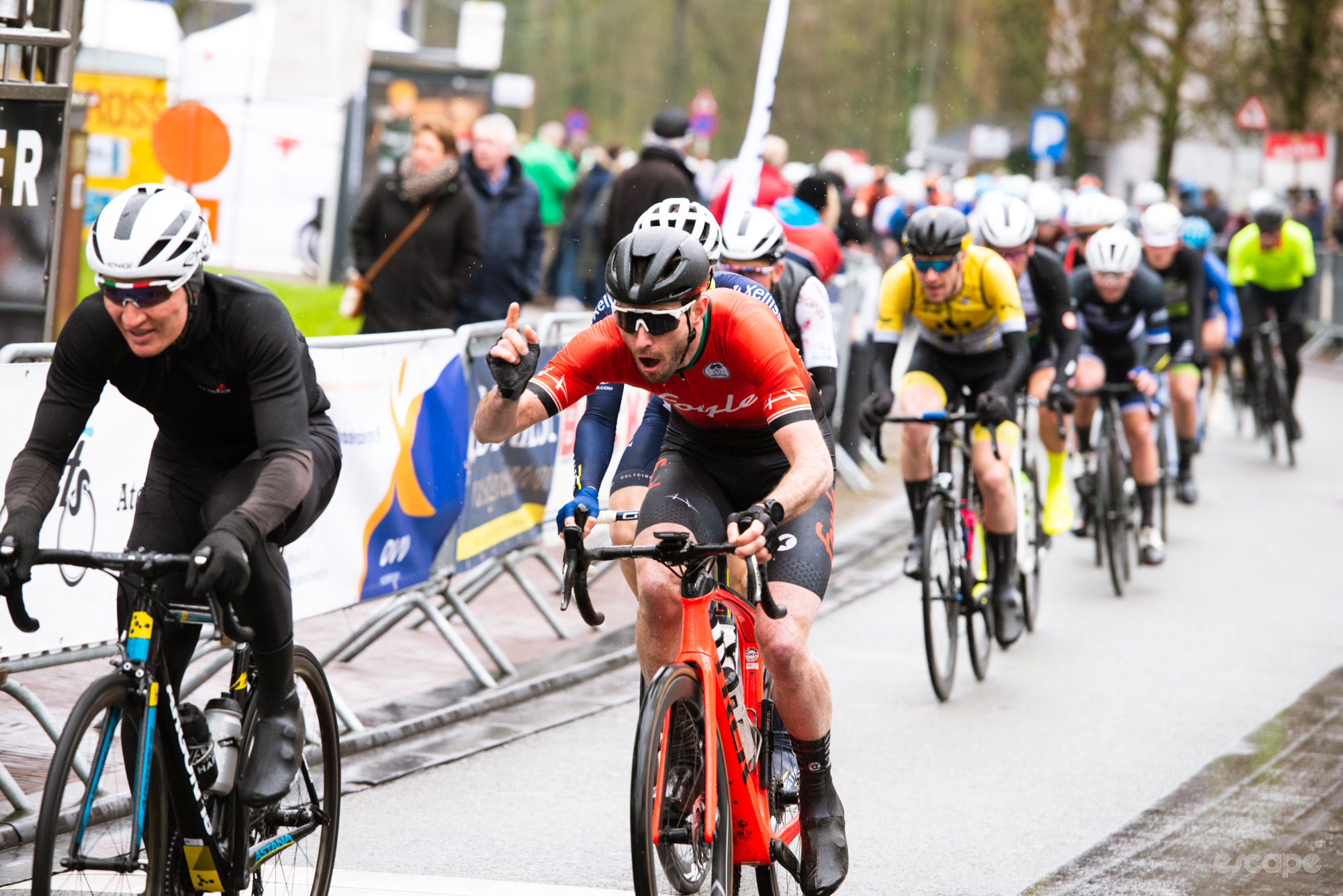
Seventeen euros to enter bike racing school. A small sum to learn the trade in the only place on the planet where a mere three or four races per week, all within an hour’s drive, is an existentially concerning drop-off in racing frequency. Back when Ronan was first doing these, around 2005, you could often race two in a day. There are no categories, really, just juniors and masters and everyone else. It’s enter at your own peril, hang on as long as you can, winners are on their way to the WorldTour and losers might be a kid on the way up or an old man on the way down; they might be your bread delivery man or, more frequently, your postal worker, because the early hours work well with the kermesse life.
There’s a Norwegian kid staying in the Flandrien with us whose recent results sheet has more 1s than any other number. Daniel Årnes. He’s quiet, sits at the quiet end of the table, eats quietly, converses when necessary. He had two bad years with injury but if you scroll way back you see he won the junior Tour of Flanders in 2018, and now he’s winning again. He doesn’t look likely to stop. Remember the name.
This race is 120 kilometers split into eight-kilometer loops. There’s a wide, two-lane boulevard that makes up the start/finish stretch before the course drops down and to the south, onto the single-lane roads that define Belgian racing. The wind hits here, every lap fracturing the group into a series of echelons like a hammer splintering a stone, small groups flying one way and larger ones another. A Jumbo-Visma development rider floats around the back, along with two Bingoal kits. These are the watched men. Only one man wears the same kit as Wout van Aert, and he and everyone else know it. His kit is cleaner; he is given more of them. In a sea of clashing color and club designs from 20-year-old templates, the semi-pros are more put together, more pro looking. But crucially, they are not pros yet. To race a kermesse one must be zonder contract.

They tailgun, riding all the way at the back, slightly more upright than the rest, unaerodynamic posture exuding an unmistakable confidence. They aren’t really trying yet and want everyone to know that when they do, when they hunch over the bars like everyone else, you better be ready.
The man in blue suede shoes and the handlebar moustache hasn’t put Ronan on his board. No great surprise there. We ask if he will. Jonny pulls out his phone, showing the bookie a photo of our racehorse. We chose an image where Ronan doesn’t appear particularly fast, gilet half unzipped, bit awkward looking, in the hope of securing better odds. The bookie takes the phone, nods to himself. Twenty-five to one, he says. Bit pricey, we think, but this man doesn’t know if we’ve brought a ringer from across the channel. We acquiesce. Jonny hands him a ten, five each way. The bookie scribbles on a piece of yellow paper, handing it to Jonny. He says good luck, gives us a big moustachy smile, so that the waxed tips point up toward his ears. We walk back to the metal fencing, intent on imparting to Ronan that this is now serious. He has work to do.
Lap five. A particularly large hammer comes down in the crosswinds and the field splits. The Jumbo and the Bingoals, still hanging around the back like Mathieu van der Poel at Flanders, miss it. Group two for them. Up the finish climb they spread their group thin, chewing their bars and on the rivet, aerodynamic now because it’s on and their pride is at stake. The gap stretches, fed by a strong rotation up front, while the second group sits on those recognizable shoulders. Heavy is the burden of proximity to Wout.
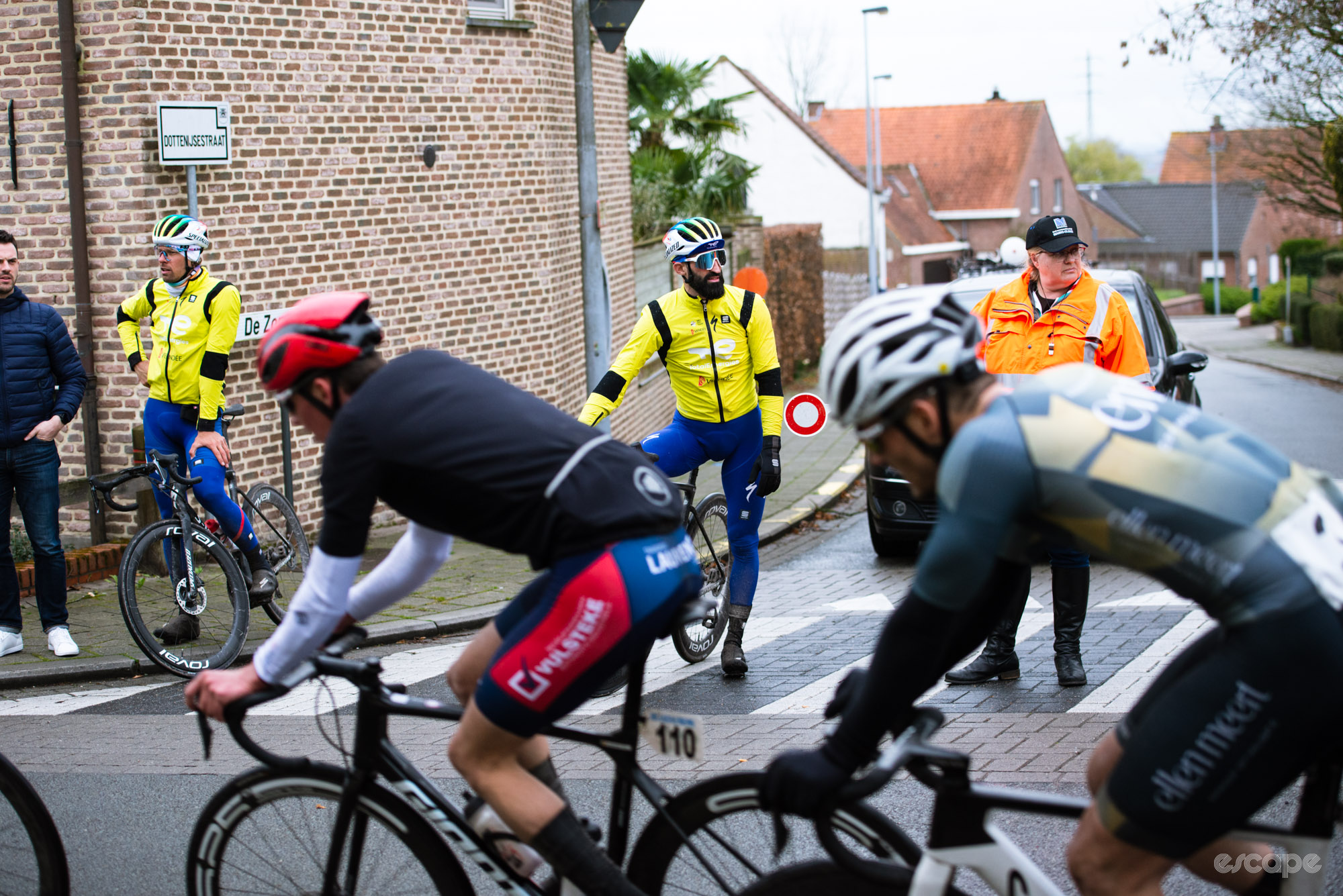
Peter van Petegem, Flanders and Paris-Roubaix winner, leans on the metal barriers near the start finish. He pauses for the occasional photo but most of the kermesse regulars seem used to his presence.
Ten years ago, when Ronan was last racing these, he was the equivalent of one of the Bingoals. Riding for a good team, An Post, he teetered for seasons only one or two good results away from a pro career. He raced these kermesses but his focus was on the pro races, on the weekends, the events that stood between him and the dream. To truly care about a kermesse was beneath him, he believed. It was a belief he now regrets. “I was maybe kidding myself,” he says. “The best riders win these, I never did. How can something you’ve never won be beneath you?”
The truly talented pass through the kermesse scene with relative ease – see Daniel Årnes – while plenty of talent sits somewhere halfway in and halfway out. The Jumbo and the Bingoals, maybe. Sitting upright, taking extra wind, riding in inefficient ways only to indicate that they are above this current station. Now chasing, on the rivet and tasting pennies, as efficient and possible, in group two. A bit of hubris.
The groups come by, still splintered. We can’t see Ronan. Jonny took a video as the peloton flashed by, he scans it, but no luck. Mildly concerning. I have visions of an afternoon in a Belgian hospital getting a collarbone plated.
But no. Ronan pops out of the back of a white van, the broom wagon. He pulls his bike out, and then his chain, which is no longer attached. There goes our ten euros.
“This is ideal,” Ronan says, genuinely pleased. “I’m buzzing.”
Racing never leaves you. If you loved it once, you’ll love it always. A lap or two playing it safe, moving up on the outside, gave way to sharpened elbows. Hanging on for an hour was Ronan’s goal. He did, just about. It took 293 watts, a series of minute-long efforts over 500, a heart rate of 153 beats per minute. He didn’t crash, even when the chain broke. “I forgot how much I loved it,” he says.
Van Petegem, still hanging on the metal fencing, spots the broken chain as Ronan click-clacks back up to return his number and get his five euros back. “Bad luck, eh,” he says, giving Ronan a thumbs up. Only in Belgium.
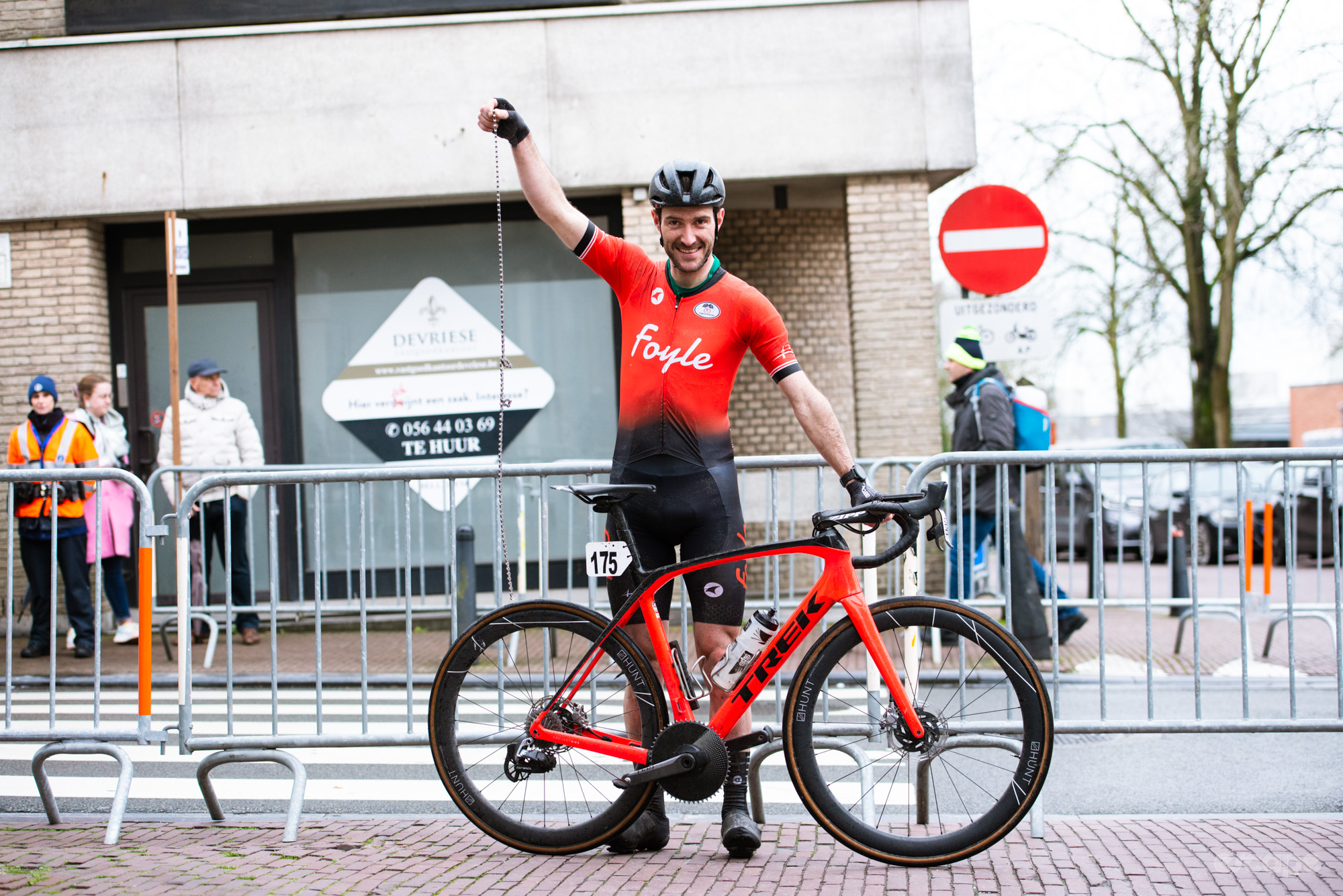
What did you think of this story?
